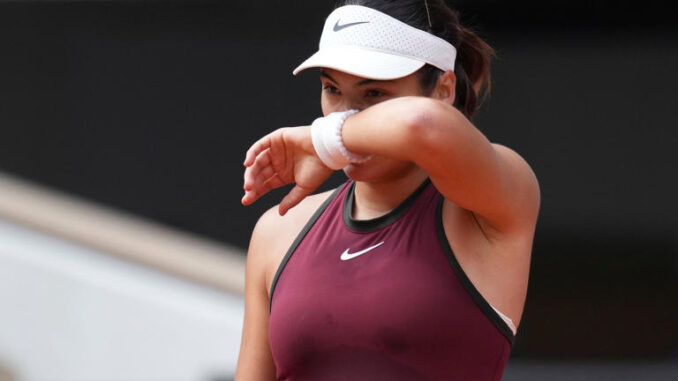
Emma Raducanu’s meteoric rise to stardom at the 2021 US Open, where she clinched the title as an 18-year-old qualifier, remains one of tennis’s most remarkable fairytales. However, her coach, Mark Petchey, has issued a candid warning that the sport has transformed dramatically since that historic triumph, presenting new hurdles for the British No. 2 as she strives to reclaim her place among the elite. Following a decisive 6-1, 6-2 defeat to reigning French Open champion Iga Swiatek in the second round at Roland Garros on May 28, 2025, Petchey emphasized that Raducanu must adapt to a rapidly evolving game to close the gap with the world’s top players.
Now 22 and ranked 41st globally, Raducanu has struggled to replicate the magic of her US Open run. Her recent loss to Swiatek, though a marginal improvement over a 6-1, 6-0 thrashing by the same opponent at the Australian Open earlier this year, underscores the challenges she faces against top-tier competition. A similar 6-1, 6-2 defeat to world No. 2 Coco Gauff in Rome further highlighted the steep climb ahead. With only one win in nine career matches against top-five players, Raducanu’s journey back to the upper echelons of the WTA rankings is proving daunting. Petchey, who began coaching her informally in March 2025, is clear about the task at hand. “Since I started helping Emma, I said she needs to start closing the gap between the best players,” he stated, acknowledging the formidable challenge posed by players like Swiatek, who boasts a 23-match winning streak at Roland Garros.
Petchey, a seasoned coach who previously worked with Andy Murray and also serves as a pundit for TNT Sports, pointed to significant changes in the sport since 2021. “From my point of view, it’s tough on Emma as I still feel everyone is living in 2021,” he said. “The games have changed massively, the balls are four times heavier than back in 2021, and Emma isn’t the biggest hitter out there.” This shift in equipment, particularly on the slow, demanding clay courts of Paris, has amplified the difficulties for Raducanu, whose game relies more on precision and versatility than raw power. “If you can’t put the ball through the court on a windy, heavy clay court day against someone like Iga, you’re going to get into all sorts of trouble,” Petchey explained, highlighting how conditions exacerbate the challenge against dominant players.
Despite recent setbacks, Petchey remains optimistic about Raducanu’s potential, urging fans and critics to look beyond her 2021 heroics. “My mantra to her has been ‘you are starting your career now. Everyone is judging you on what happened in 2021, but the reality is, I want to see you building a career here where people judge you in two years’,” he said. This long-term perspective reflects Raducanu’s need to rebuild her game and physical resilience, especially after a career plagued by injuries. Since her US Open triumph, she has battled wrist, ankle, and back issues, undergoing surgeries in 2023 that sidelined her for much of the clay and grass seasons. Her arrival in Paris was marred by fitness concerns, yet Petchey staunchly defended her dedication. “I’m a little tired of hearing people say that she doesn’t work hard,” he asserted. “I spent 10 months with her in 2020, and I’ve spent every day that I can with her since Miami, and not once has she not put in a full day shift.”
Raducanu’s coaching journey has been as turbulent as her injury history. Since parting with Andrew Richardson, who guided her to the US Open title, she has worked with multiple coaches, including Torben Beltz, Dmitry Tursunov, and Sebastian Sachs. Her brief stint with Vladimir Platenik in early 2025 ended due to a lack of chemistry, underscoring her preference for collaborative coaching relationships. Petchey, who also coached her as a junior, acknowledges that his role may be temporary. “She doesn’t need me to sit between 20-50 in the world, and if I’m not the best choice, she needs to find the best choice,” he said, emphasizing the importance of finding the right fit to elevate her game.
Raducanu’s recent performances, including a promising four-match run at the Miami Open, suggest glimmers of her potential. Her ability to defeat players like Amanda Anisimova and Maria Sakkari in 2025 shows she can still compete at a high level. However, surfaces like hard courts and grass, where her game is better suited, offer more hope than the grueling clay. “On hard courts and grass is a lot closer compared to where Emma was in Australia against Iga,” Petchey noted, indicating that strategic adjustments and patience will be key.
As Raducanu navigates this new era of tennis, her resilience and adaptability will define her path. Petchey’s guidance, rooted in both tough love and unwavering support, aims to steer her toward a sustainable career. With the tennis world watching, Raducanu’s journey is a testament to the challenges of sustaining early success in a sport that never stops evolving.
Leave a Reply